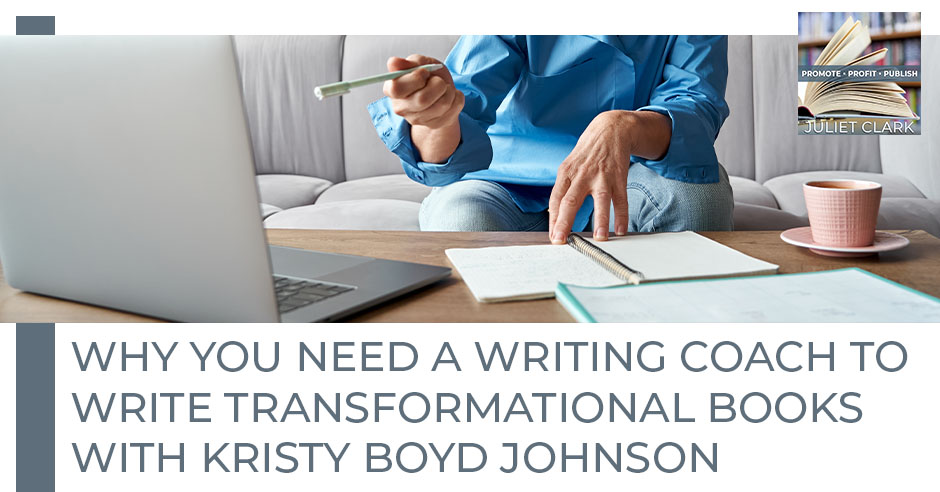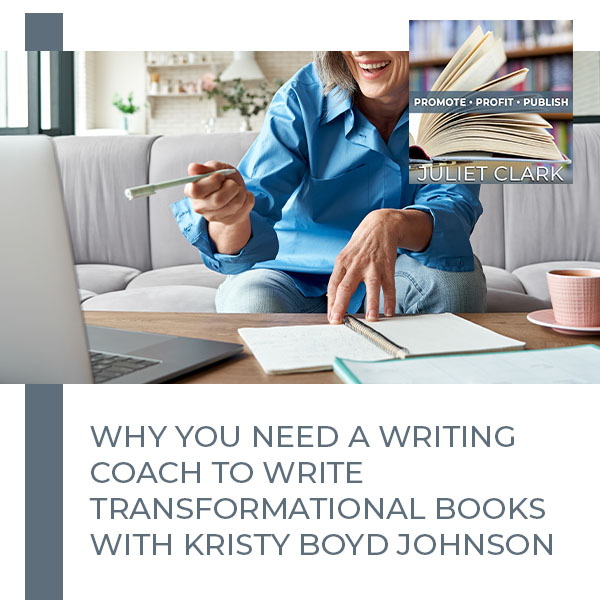
Do you have a passion for writing but don’t know where to start? Writing the first draft is not an easy task, but it’s evident that you have to start something now to have that book finished. In this episode, Juliet Clark talks with the Executive Editor at Turtle Sea Books, Kristy Boyd Johnson, about developmental editing to help entrepreneurs turn their creative ideas and knowledge into transformational books that sell. Kristy Boyd Johnson is an award-winning author who developed a serious interest in writing for kids and teens as a young teacher. She discusses valuable insights on having a writing coach that could help organize your thoughts, ideas’ creative flow, and other important things such as punctuation, spelling, grammar, and sentence structure.
—
Watch the episode here
Listen to the podcast here
Why You Need A Writing Coach To Write Transformational Books With Kristy Boyd Johnson
I want to remind you before I introduce the guest to go over, follow us and subscribe on YouTube. Also, don’t forget to take the Promote, Profit, Publish Quiz and find out if you are ready to get your book published. You can find it at www.PromoteProfitPublishQuiz.com. That quiz is going to go right along with who we’re talking to because we’re going to ask a lot of marketing questions and find out if you’re ready.
The guest is a repeat. She was back on one of my first episodes. It’s Kristy Boyd Johnson. She is an award-winning author who developed a serious interest in writing for kids and teens as a young teacher. Over the years, she has ghostwritten over 30 non-fiction books for entrepreneurs. She now consults as a developmental editor to help entrepreneurs turn their vast knowledge into transformational books that sell. Welcome, Kristy.
Thank you, Juliet, for having me back.
Kris and I talk all the time. It’s funny because it’s Kristy Boyd. I always call her Kris. Kris and I met in 2014 or 2015 at an event. We found ways to work together over the years. She is my trusted book coach and editor for people who bring me books. I want to talk a little bit about developmental editing and the writing coach aspect because a lot of times if you hire a good writing coach, you don’t need that developmental edit.
This is true. Book coaches come in all shapes and sizes, everything from helping you get that idea all the way through writing your first draft. There are many forms of book coaching. You have to determine what is best for you and your book. I have found that most of the help they need is getting very clear on who their audience is that they are communicating within their book and letting go of that, “I have so much information. I have to tell everything I know in this book.” Don’t do that. It’s a big boo-boo. Let go of that.
Let me give you an example. In my former life, I was a special ed teacher. I had a friend who was way above me in the ranks and knew everything. She wanted to write a book and I was helping her. She wanted to put all of her information and had tons of information but the problem is that she had three different audiences to choose from. She could have been talking to other special ed professionals, in which case, the way that she would be able to use the languaging in the book would be she could use jargon and teacher-speak.
We would all understand it but if she were writing to classroom teachers that were not special ed teachers, she had to figure out a different way to communicate because those are different languages. The third audience would be parents. If she had decided to write her book geared towards parents to help parents of special needs kids, that is a book you cannot use jargon with. You have to speak in a clear and easy-to-understand language.
Once she got clear that she did, in fact, want to write for parents, we worked hard to make sure that the way she was communicating her message was clear for parents that parents could understand what they were seeing, experiencing, what to expect and specific things they could do to help their child in an easy-to-understand language. That was an important thing. The second thing was the transformation that she offered. Offering all of her knowledge is too overwhelming. It had to be a specific thing.
Every book is a journey into healing some part of you. Share on XFor example, in her first book, she did several. Her first book was about dyslexic children. We brought it down because there’s a myriad of learning disabilities out there. We specifically focused on parents of dyslexic children. She gave clear examples of, “This is what a dyslexic child says. This is what they do. This is what the teacher will tell you that they are seeing in the classroom,” so that parents could go, “That’s what’s going on with my kid,” and then specific steps of what to do to help that child both at home and school.
When you’re working with someone who is very good at helping you focus your audience and topic, those two things are what create your transformational book. You can’t beat that because once your audience starts reading those books, they will go to you for information every time. Not the guy down the street who is overwhelming them with all this information they didn’t want.
A lot of the people that we send over to Kris that haven’t worked with book coaches before, there’s a lot you cut out of their book. They’re always shocked about, “I know I sent one over to you.” He was looking at me like, “She said to break this up into three books.” I was like, “I told you that. That’s why I sent you there.” Having a good book coach allows you to get it organized in a way that makes sense to the reader. It helps you avoid that developmental editing which can be very expensive. Can you explain to the audience the difference between developmental editing and proof?
A developmental editor will take a rough manuscript, which your first draft is always a rough manuscript. Anybody who thinks that they can write one draft and it’s golden, sorry. I hate to disappoint you but that isn’t real. There’s nobody, including JK Rowling and Stephen King, who doesn’t need to have a good editor work with them. Developmental editing is taking your raw idea and shaping that manuscript into something that is workable, salable and all the things that go into selling a book.
On top of that, all the other things that go into editing anyway like punctuation, spelling, grammar, sentence structure and making sure that the book isn’t one long sentence with no periods. If you start your project with a book coach, the first thing that’s going to happen is you’re going to get focused on your audience and topic. That right there is going to help you save a ton of time with not spinning in your head going, “What am I doing?” It’s going to help you get like, “I know what I’m doing now.”
The coach will guide you along the way. “These are your sections. In this section, we need a case study or a story,” depending on what your topic and expertise are. “In this section, we need some statistics, proof and testimonials.” It helps you shape it from the beginning so that when you get to that first draft, you probably won’t need a developmental editor.
You’ll just need the final proof, which you have to have a final proof before editing because there’s a thing that happens when all writers, every writer on the planet and their editors. It’s that when you read something many times, your brain fills in gaps and you stop seeing the typos. I always tell, “I’m sending this to you. I’ve caught a lot but have fresh eyes and check for typos.” She does and there are always a few no matter how good you are.
Even when Kris developmentally edited my last book, we went page by page by the time we were done with it, reformatting ideas and doing a lot of things that we should have done upfront. We took so long writing the book between the two of us that the ideas morphed. I was probably one of her most difficult clients with it. Working with a writing coach, typically, what’s the time frame and cost versus developmental? I know the developmental edit is word-count-specific. How much would you say working with a good book coach do you think?

Writing Coach: There’s nobody who doesn’t need to have a good editor work with them. Developmental editing is taking your raw idea and literally shaping that manuscript into something saleable.
I charge $2,000 per month for the duration. For focused writers, I’ve had it as short as two months where we put it together. That was with a motivated person who had a specific deadline, where he had to have his book to you within two months. We did it but it was a lot of encouragement on my part.
It was stressful. That’s what she’s trying to say. Stop being tactful.
It was a lot of butt-kicking. I’m this combination of a nurturing Earth mama and butt-kicking coach like, “Do it. Stop rewriting your chapters.”
When you start rewriting your chapters over and over at the end, that’s you sabotaging yourself and procrastinating. We see a lot of that at the end, the impostor syndrome. If you don’t know what impostor syndrome is, go look up the episode with Jen Coken because she works with impostor syndrome people who do this in other areas of their lives besides the book. It’s fear. We’ve noticed that with him over and over that he gets fearful and all of a sudden, he can’t remember what he is an expert at it. It’s hard to watch like, “Why are you asking me? You’re the expert.”
If you start feeling that perfectionism coming on, that’s a perfect time to call your coach and say, “I’m in trouble. The perfectionist is rearing its ugly head.” We have to deal with it because that’s the spin in your head. We’ve all done and felt it, not just with writing but starting a new project or trying to figure out a solution to a problem. We spin, go over it and make ourselves crazy. That’s where a coach can help you be clear, get past it quickly and get back on track.
When you’re working with the coach, too, I know a lot of them will encourage you to go out and get those endorsements as well. We have some people who come and they don’t have endorsements where we have to pick up the ball and say, “Go get them.” A lot of the coaches we work with will have those in advance as well. Is that something you have that you prod them along the way to go do?
I talked to them about having the testimonial pages in the book. I like to have a few at the beginning and then tell them to sprinkle them in but then, there are certain topics where that wouldn’t be appropriate. The coach can help you figure those things out. I finished up with a client where her topic was such that we were able to find wonderful quotes by celebrities to sprinkle through the whole manuscript that drove the point home and it worked out well.
I worked with her on where we placed the quotes because that was important too. Where they went in the manuscript was an important key. The questions of, “Do I have someone write a foreword or not? Do I put in my personal journey? How do I do that? Do I need appendices or not? Do I need an index or not?” It’s all those little things that make people crazy.
Most writers need most of the help they need to get very clear on who their audience is. Share on XThe endorsements seem to be difficult for people because you have to be bold. I’m going to give a shout-out here to a book that’s coming out in October 2021. It’s called Namaste, Bitches by Amy Thompson and Michelle Burke. When I was working with them on their endorsements, they reached out to the Dalai Lama. They told me they were going to do it and I was like, “Okay.” They showed me a letter that they got back from the Dalai Lama.
He is not promoting their book but it’s such a great example of who is out there that you can ask. He said no in the most wonderful way because he is the Dalai Lama. It was probably a staff member. We’ve had people too who have said, “I want this guy,” and then you start putting out your feelers with, “Who knows who that knows that person?”
Amy Powers’ book back in March 2021, she got that person. I reached out to someone who knew that person, who introduced her to this person’s son who got the endorsement. You have to be bold about that part of your book too. You can’t just be the writing mouse. You have to start getting bold about who you’re asking and what you’re doing and promoting early.
One of the simplest ways to get endorsements is to ask your clients. If they ask their clients that they know anyone who would be interested too, that is helpful too especially if you’ve helped that client have a transformation in their life depending on what your expertise is.
We watched Malin Svensson do that with Jane Fonda. She is Jane Fonda’s personal trainer. Jane did an event with her. That was a client she reached out to, to help support her. There are all sorts of stuff but you need to be doing it all the way along. The real value in a coach is when people do bring their books to us. We can see clearly who has worked with one and who hasn’t.
I can also see who has taken the time to do some form of editing. If I get a raw manuscript that has had no editing, to me, it’s almost like I’m back in school and I’m reading a paper written by one of the kids.
I’m guilty of that. I’ll probably never read another book. I’ve not had it with books.
Honestly, you were one of my easier clients.

Writing Coach: If an idea comes to you and you don’t act on it, then at some point, that higher power is going to give that idea to another person, someone who will act on it.
That’s funny. I feel sad for you.
Clients are funny. Like any business, there are the easy and difficult parts. Writer’s block is made up of whatever block is in the client. They want to do it their way and they don’t want to hear that it’s not going to work but we have reasons that it isn’t going to work. You have to understand this because you want your book to sell, be read and out there. It’s an art to move people past their blocks and help them heal the blocks without feeling like they’ve been beaten with a stick.
That’s true though because you and I have talked before. When I was writing my mystery novels, I would come across blocks. A lot of my mystery novels had true events or events perceived as true in the eyes of a child that maybe as a grown-up weren’t exactly the same. I always felt like when I got writer’s block and you can substitute whatever your favorite is. I call it God but if it’s your higher power or whatever you call your higher power.
I’m saying, “I’m going to let you create something extraordinary here but you’re going to have to heal something for me, go through an obstacle and correct.” That was always what happened is I have to pause. I wouldn’t be writing but I would be very aware that there was something going on that was coming up that had to be healed in that process.
My favorite thing that goes along with that is when I read Elizabeth Gilbert’s Big Magic. That whole idea that if an idea comes to you and you don’t act on it then at some point that higher power is going to say, “I’m giving it to Kris. I’m taking it someplace else with somebody who will act on it.” I know people say that it sounds cliché but it is. Every book is a journey into healing something.
Every book, bar none, is messy. You’ll get all excited in the creative flow and that feels awesome and then you get to the hard part. Getting a first draft seems like the hard part but it’s not the hard part. It’s the second draft. It’s like jumping out of an airplane. The first time you learn how to parachute, you’re like, “Let’s go.” The second time, you’re like, “I’m not going back up there. I know what’s coming.”
Comes the marketing piece, which people are like, “The book was so easy.”
The editing part is the hard part. When the book coach is taking you through the part of, “We’ve got our viable first draft. Now, we’re going to take it apart and put it back together again in a way that works.” Most of the stuff that I’ve taken out of people’s books that I’ve edited, it’s repetition. Inevitably, they repeat themselves over and over.
Having a really good book coach allows you to get things organized to make sense to the reader. Share on XThat comes from the passion for the topic but it doesn’t work in a book because people don’t want to be beaten over the head. They would rather have a shorter book that is right on point with what they need especially in this day of tweets, texts and instant messages. Everything is like big fat books. Unless you’re Stephen King or JK Rowling, don’t do a big fat book. It doesn’t work.
That’s why we have audiobooks now because you can listen to the story. I can’t remember the last time I read a big book. If we want to connect and work with you, where can we find you and connect?
My email address is Kristy@TurtleSeaBooks.com. If you email me, it comes directly to me. You will get me. That’s probably the easiest way. You can go to the website TurtleSeaBooks.com too if you want to look. It’s in development but it’s up so you can check it out. You can find me on Facebook under Kristy Boyd Johnson.
Thank you so much for sharing your information.
Thank you for having me, Juliet. I appreciate you inviting me back.
Important Links
- YouTube – Superbrand Publishing
- www.PromoteProfitPublishQuiz.com
- first episodes – past episode with Kristy Boyd Johnson
- Kristy Boyd Johnson
- Jen Coken – past episode
- Big Magic
- Kristy@TurtleSeaBooks.com
- Kristy Boyd Johnson – Facebook
About Kristy Boyd Johnson
 Kristy Boyd Johnson is an award-winner author who developed a serious interest in writing for kids and teens as a young teacher.
Kristy Boyd Johnson is an award-winner author who developed a serious interest in writing for kids and teens as a young teacher.
Over the years, she has ghostwritten over 30 non-fiction books for entrepreneurs.
She now consults as a developmental editor to help entrepreneurs turn their vast knowledge into transformational books that sell.
Love the show? Subscribe, rate, review, and share!









Leave A Comment